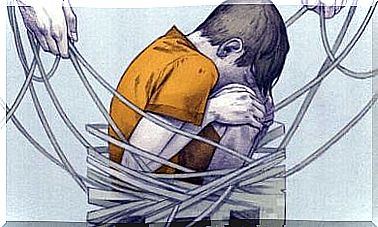Happiness And Pleasure: How Are They Related?

What is the relationship between happiness and pleasure? There are so many definitions of happiness that it is impossible to list them. It’s as if each one of us has a very specific profile in which there is a multicolored set of elements, shaping a particular structure. Within this universe, pleasure dwells.
We could understand pleasure as the sensation – or subjective element – associated with the positive, with the euphoria that, many times, is born from the satisfaction of a need or desire. In other words, pleasure would be closely related to relief, but also to ambition.
Furthermore, within pleasure we find another peculiarity: some define it as the absence of pain. Nevertheless, there are many people who seem to think otherwise: we are talking about sadomasochism.
This association is much more real than we think. For example, it’s not unusual to see pain expressed on the faces of many athletes, yet it’s a feeling they enjoy. So we could talk about it a little more precisely and say that the opposite of pleasure would be pain, but uncontrolled pain, which the person cannot stop or regulate.
Something very similar happens with fear. Many people are able to enjoy this emotion when they know in advance that what is about to happen will have no real-life consequences, as in a book or movie. Pleasure is born, then, from “cheating” the brain.
The happiness
A song by Van Gogh ‘s band La Oreja says that happiness is a lovely smile makeup. This is reflected in the fact that in our society, happiness may have become just another object of consumption. An object that has come to have a value and that demands to be who we really are not.
This happens when we are part of a cycle that, perhaps, adapts us to society, but which also denaturalizes us a little.
Thus, we gained inconvenience working longer hours and accepting poor working conditions to pay for activities that we used to do ourselves and in which the community helped. We are talking about making food, cleaning the house or taking care of the children.
In this sense, some studies say that this state that we can call happiness is obtained through balance, a good management of desires, a good organization of the pyramid of needs and a meaningful social contact. However, this personal contact seems to follow a norm: the less work it is, the greater the chance of being meaningful.
In other words, a social contact that requires a low investment of resources would be, for example, a telephone conversation lying on the couch. A social contact that requires considerable investment would be one that we have to move into and to which we are somehow going to isolate ourselves.
Furthermore, a real state of happiness changes our perspective on the world. It puts us in a position to ask ourselves the following question: “What can we give?” instead of “What can you offer us?” This leaves behind the dimension of being people in need and transforms us into people who can help meet needs.

happiness and pleasure
Perhaps one of the differences that best limit the space between happiness and pleasure is that the latter has a much simpler (primitive) neuronal circuit. This provides, among other consequences, that pleasure can be very destructive.
We talk, for example, about addictions. Let’s think that, in some way, pleasure does not fail to reinforce a way of covering a need. For example, smoking when someone feels anxiety is growing.
On the other hand, happiness seems to be the horizon that responds to the restlessness of the human being that goes beyond adapting to the environment. It also has to do, and a lot, with the adaptation/acceptance of its characteristics.
It’s not about living longer or achieving greater reproductive success. It’s also about paying attention to how we live or how we reproduce. To talk about that, we usually add the prefix meta . For example, by thinking about how we think (assessing the quality of our thinking) we form our metathinking.
That is why, to a large extent, knowing the danger that pleasure poses, happiness is largely sustained by the management we make of this pleasure – biologically, we can say, the release and reuptake of associated neurotransmitters.
So, for example, the best way to satisfy a need is not always the most convenient, quick and economical way.
Making this change is complicated because in the primitive world there was almost no need to impose limits on ourselves.
This requires a personal evolution, just as evolved in our society, for example, supermarkets and stores offering various products at prices that allow us to consume large quantities.
Thus, this is how happiness came to have an intimate encounter with pleasure, by including a third element. A self-control that prevents us from being prisoners of a pleasure obtained in a certain way, while burying our own eudaimonia.









